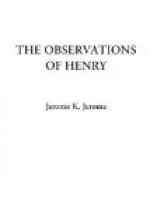“Do you mean,” I said, “there was no possible means of distinguishing?”
“There wasn’t a flea-bite to go by,” answered Henry. “They had the same bumps, the same pimples, the same scratches; they were the same age to within three days; they weighed the same to an ounce; and they measured the same to an inch. One father was tall and fair, and the other was short and dark. The tall, fair man had a dark, short wife; and the short, dark man had married a tall, fair woman. For a week they changed those kids to and fro a dozen times a day, and cried and quarrelled over them. Each woman felt sure she was the mother of the one that was crowing at the moment, and when it yelled she was positive it was no child of hers. They thought they would trust to the instinct of the children. Neither child, so long as it wasn’t hungry, appeared to care a curse for anybody; and when it was hungry it always wanted the mother that the other kid had got. They decided, in the end, to leave it to time. It’s three years ago now, and possibly enough some likeness to the parents will develop that will settle the question. All I say is, up to three months old you can’t tell ’em, I don’t care who says you can.”
He paused, and appeared to be absorbed in contemplation of the distant Matterhorn, then clad in its rosy robe of evening. There was a vein of poetry in Henry, not uncommon among cooks and waiters. The perpetual atmosphere of hot food I am inclined to think favourable to the growth of the softer emotions. One of the most sentimental men I ever knew kept a ham-and-beef shop just off the Farringdon Road. In the early morning he could be shrewd and business-like, but when hovering with a knife and fork above the mingled steam of bubbling sausages and hissing peas-pudding, any whimpering tramp with any impossible tale of woe could impose upon him easily.
“But the rummiest go I ever recollect in connection with a baby,” continued Henry after a while, his gaze still fixed upon the distant snow-crowned peaks, “happened to me at Warwick in the Jubilee year. I’ll never forget that.”
“Is it a proper story,” I asked, “a story fit for me to hear?”
On consideration, Henry saw no harm in it, and told it to me accordingly.
* * * * *
He came by the ’bus that meets the 4.52. He’d a handbag and a sort of hamper: it looked to me like a linen-basket. He wouldn’t let the Boots touch the hamper, but carried it up into his bedroom himself. He carried it in front of him by the handles, and grazed his knuckles at every second step. He slipped going round the bend of the stairs, and knocked his head a rattling good thump against the balustrade; but he never let go that hamper—only swore and plunged on. I could see he was nervous and excited, but one gets used to nervous and excited people in hotels. Whether a man’s running away from a thing, or running after a thing, he stops at a hotel on his




